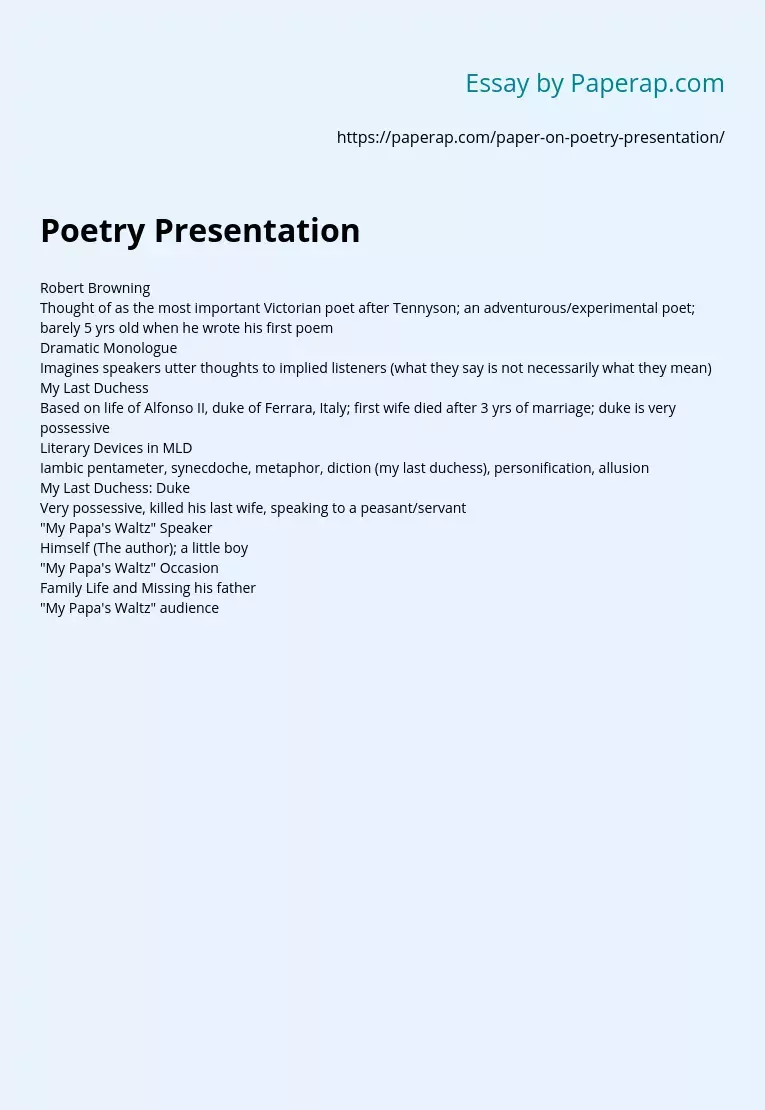Poetry Presentation
Topics:
American Literature
Essay,
Pages 4 (931 words)
Views
35
Robert Browning
Thought of as the most important Victorian poet after Tennyson; an adventurous/experimental poet; barely 5 yrs old when he wrote his first poem
Dramatic Monologue
Imagines speakers utter thoughts to implied listeners (what they say is not necessarily what they mean)
My Last Duchess
Based on life of Alfonso II, duke of Ferrara, Italy; first wife died after 3 yrs of marriage; duke is very possessive
Literary Devices in MLD
Iambic pentameter, synecdoche, metaphor, diction (my last duchess), personification, allusion
My Last Duchess: Duke
Very possessive, killed his last wife, speaking to a peasant/servant
“My Papa’s Waltz” Speaker
Himself (The author); a little boy
“My Papa’s Waltz” Occasion
Family Life and Missing his father
“My Papa’s Waltz” audience
General audience
“My Papa’s Waltz” purpose
To show the joyful moments of life
“My Papa’s Waltz” setting
His kitchen
“My Papa’s Waltz” Tone
Sad, depressing, bittersweet, nostalgic
Overall Effect of “My Papa’s Waltz”
Negative statements but wants the reader to dig deep to find the happiness in the poem
“Metaphor” Literary Era
Feminism, most female poets attempted to express their anger without angering men
Theodore Roethke
Lost his father at 15, had a fascination with nature, suffered from mental breakdowns, uncle and father committed suicide
“My Papa’s Waltz” Literary Era
Modernism; “A drive to abstract”
“Hazel Tells Laverne” Tone
Humorous, joking, enthusiastic
Historical Era of “Hazel Tells Laverne”
1970s; women began gaining rights; 60% of all working women were employed as domestic servants
Literary Era of “Hazel Tells Laverne”
Realism; authors wrote about things relevant to the world; movement against romanticism
Kathryn Howd Machan
Feminist and director of national feminist women’s writing workshops
Lasting Effect of “Metaphors”
Effects of feminism, allowed her to reach out without angering men
“Hazel Tells Laverne” Structure
Monologue; enjambment; hyperbole; symbolism
“Hazel Tells Laverne” Background
Spoken from pov of a maid/servant; feminist pov (hazel’s job, how she recounts the incident, and how she responded to the frog’s offer)
Sonnet 130: Literary Era
Wrote during Elizabethan era (English poetry received great attention), English sonnets rose, literature was accepted no matter topic, poets made own styles of poetry, coined new words
Sonnet 130: Historical Era
Golden age of English history, break from many wars, relationships were bound by physical appearance, allowed for love and happiness due to break from wars
Shakespearean Sonnet
3 quatrains (3•4 lines) & a couplet (2 lines); first 12 lines are description/narration; couplet contains poet’s main idea
Italian Sonnet
1 octave(8 lines) and a sestet (6), contains an octave (the argument), and the counter argument
Sonnet 130 Analysis
Parody of typical love sonnets at the time; emphasized normal beauty; denotes women in poetry
Sonnet 130 Literary Devices
Metaphor, connotation, antithesis
“The Man He Killed” Analysis
The war was hard on its soldiers; showed the regret and horrors of war
Thomas Hardy
Influenced by Romanticism; wrote during Victorian era; focused on war and its effects
Historical era of “The Man He Killed”
Boer war; World War I; poem about a regretful man thinking of war
Literary Era of “The Man He Killed”
Victorian era: narrative poems, not lyrical, meter and rhythm used more often than imagery, common theme was to discuss moral issues
Overall effect of “The Man He Killed”
Shows his guilt in killing another man
Robert Frost
Had 5 children (2 developed mental illnesses), received 40 honor degrees, loved nature
Historical Era of “Nothing Gold Can Stay”
Social & political change: many were uncomfortable with rapid urbanization, nature/rural areas were industrialized, women were granted the right to vote, America was the most wealthy country
Literary Era of “Nothing Gold Can Stay”
Realism: belief that a single reality could be determined through observations of nature
Modernism: belief that people ale their own meaning in the world
Modernism: belief that people ale their own meaning in the world
“Nothing Gold Can Stay” Analysis
Nature is priceless, the rural areas are more beautiful/precious than the urbanized cities
Purpose of “Nothing Gold Can Stay”
Beauty and value is slowly fading and that nothing good can last forever
“Richard Cory” Analysis
Spoken from pov of the working class, occasion: the shocking death, tone: ironic, unfortunate
“Richard Cory” Themes
More than what lies at the surface, affluence does not guarantee mental stability/happiness
Edwin Arlington Robinson
Came from a wealthy family, lived in the shadow of his brother, the poem is about his brother’s life
Literary Era “Richard Cory”
Realism in America: opposite of romanticism, describes the world as one sees it, realistic
Historical Era: “Richard Cory”
Industrial revolution & the panic of 1893. The closing of banks lead to the loss of author’s entire family fortune
Sylvia Plath
Killed herself @ 30, very depressed, highly feministic
“Mirror” Literary Era
Confessionalism: 1950-60; Beats Movement: writers opposed to affluence & authoritarian control
“Mirror” Historical Era
Great Depression, World War II, Korean War, Beginning of Vietnam Conflict, Cold War
Sylvia Plath: Biography
Tried to kill herself at age 10, father died, married and later divorced, her son committed suicide
“Mirror” Symbolism
Mirror: overpowered men, ideals of society; faces and darkness: men and their dominance
“To an Athlete Dying Young” analysis
‘From fields where glory does not stay’ = the graveyard
“Ex-Basketball Player” Analysis
‘Berth’ = his final resting place
Victorian Era
Narrative poems, not lyrical, meter and rhythm used more often than imagery, common theme was to discuss moral issues
Feminist Literary Era
Attempted to express thoughts without angering men
Modernism
‘A drive to abstract’
Belief that people can create their own meaning in the world
Belief that people can create their own meaning in the world
Realism
Things relevant to the world; drive against romanticism
Elizabethan Era
English poetry received great attention, English sonnets rise, literature was accepted no matter topic, poets made new forms of poetry and coined words
Confessionalism
Focused on extreme moments of individual experience, the psyche, and personal trauma
Poetry Presentation. (2017, Nov 28). Retrieved from https://paperap.com/paper-on-poetry-presentation/
